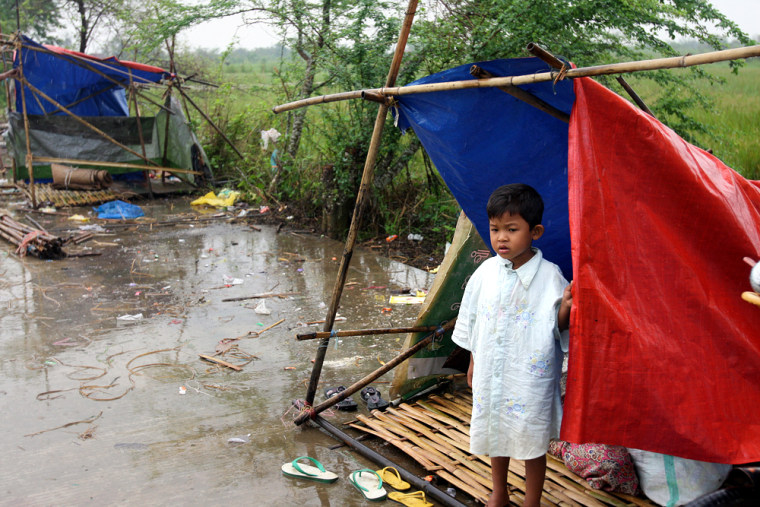Myanmar slowly relented to international pressure to accept more outside help, but state media said Wednesday that the government will not allow U.S. warships and helicopters poised off its shores to deliver aid to cyclone victims.
The New Light of Myanmar newspaper said such military assistance "comes with strings attached" and cited a Web site article saying Washington wanted to overthrow the country's military regime and grab its oil deposits.
The United States, as well as France and Great Britain, have naval vessels loaded with humanitarian supplies off the Myanmar coast, and had been waiting for a green-light to deliver them. The article did not mention the French and British navies.
Myanmar's xenophobic leaders have long feared an invasion by the United States, moving their capital to a remote area of central Myanmar equipped with bunkers.
U.N. chief headed to country
The newspaper commentary came as U.N. Secretary-General Ban Ki-moon was heading for Myanmar after warning that relief efforts to save hundreds of thousands of cyclone victims had reached a "critical moment."
Before his departure from New York, Ban said the military-ruled nation had given the U.N. permission to operate nine helicopters, which would reach cyclone-hit areas that had so far been largely inaccessible."
His announcement was not immediately confirmed by officials of Myanmar's military government.
"I believe further similar moves will follow, including expediting the visas of (foreign) relief workers seeking to enter the country," Ban said. "I'm confident that emergency relief efforts can be scaled up quickly."
U.N. Undersecretary-General for Humanitarian Affairs John Holmes left Myanmar after seeking to persuade the junta to let in more international assistance and paving the way for Ban's visit, which begins Thursday.
Holmes said he told Myanmar's prime minister, Lt. Gen. Thein Sein, that the U.N. wants to support aid efforts, "as we would do in any other country in any disaster of this scale, where clearly the size of the tragedy outweighs the capacity of any country to deal with it by itself."
The junta appears to be slowly relenting to foreign pressure to accept more outside help, but even foreign aid workers already in the country are still banned from the areas of the worst devastation. The U.N. said only a fraction of survivors had gotten any international assistance.
The official death toll stood at about 78,000, with 56,000 more people missing. Conditions in the low-lying Irrawaddy River delta remained precarious, with survivors facing disease, malnutrition and exposure to the elements.
The New Light of Myanmar article thanked the United States for airlifting in aid, but said "the strings attached to the relief supplies carried by warships and military helicopters are not acceptable to the Myanmar people."
The U.S. is flying supplies in from Thailand on C-130 cargo aircraft, at a rate of about five flights a day. But the planes go to Myanmar's biggest city, Yangon, from which it is a difficult journey to the Irrawaddy delta.
The article did not explain why the C-130s, which are military aircraft with U.S. military personnel aboard, were acceptable.
Fear of U.S. meddling
It referred to an article on the Workers World Web site titled "US hostility hampers relief" in which the author reportedly said the United States wanted to topple the regime and sought access to the country's large oil deposits.
The U.S. naval flottila is made up of four vessels while the British have a frigate standing by and the French an amphibious assault ship, Mistral. The ships are carrying both relief supplies and medical personnel.
Ban was expected to arrive in Bangkok, the capital of neighboring Thailand, on Wednesday and to fly on to Yangon on Thursday. In Myanmar, he was expected to visit areas devastated by Cyclone Nargis and to talk with officials and aid workers.
He was also scheduled to attend a meeting of aid donors in Yangon on Sunday. Myanmar, one of the world's poorest nations, claims losses from the disaster exceeded $10 billion.
At U.N. headquarters, Ban said he was confident aid efforts can be increased. He welcomed the junta's "recent flexibility" in allowing relief workers from the 10-country Association of Southeast Asian Nations — of which Myanmar is a member — to begin distributing aid.
Tin Sein, A Myanmar doctor returning to Yangon from the delta, said that refugees in the bigger towns were getting some aid and medical care but that villagers were still trickling in from outlying areas that have received no aid.
"We saw one young girl yesterday. Her lips and her nails were blue. She looked like she was going to die," Tin Sein said. "People haven't eaten or drunk clean water and are completely exposed to the rains and storm."
